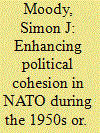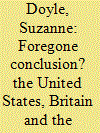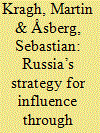|
|
|
Sort Order |
|
|
|
Items / Page
|
|
|
|
|
|
|
| Srl | Item |
| 1 |
ID:
154816


|
|
|
|
|
| Summary/Abstract |
The years following the signature of the Nuclear Non-Proliferation Treaty (NPT) of 1968 have generally been seen as a period of neglect in US non-proliferation policy. While joining recent scholarship questioning this, the article also shows that the policies that emerged from the Nixon–Ford years were the product of a broad range of factors that constrained both the United States’ ability and willingness to build an effective non-proliferation regime. These included the Nixon administration’s initial skepticism regarding the NPT, as well as the global dispersion of power away from the US, combined with the continued importance of anti-Soviet containment.
|
|
|
|
|
|
|
|
|
|
|
|
|
|
|
|
| 2 |
ID:
154815


|
|
|
|
|
| Summary/Abstract |
This article argues that the perceived need by NATO to nurture political cohesion within the Alliance during the 1950s resulted in the adoption of strategic concepts that were out-of-step with the military environment in which it was operating. It maintains that the Alliance acquiesced to American leadership on nuclear issues which led to the development of tactical nuclear capabilities at the expense of conventional war-fighting capabilities for the defence of the European Central Front. This resulted in a strategic concept that enhanced political cohesion but was militarily unviable.
|
|
|
|
|
|
|
|
|
|
|
|
|
|
|
|
| 3 |
ID:
154817


|
|
|
|
|
| Summary/Abstract |
Existing studies of the United Kingdom’s purchase of Trident D5 missiles have simplified the Reagan administration’s sale. Using previously classified documentation, this article highlights the potential political and financial ramifications of a sale agreement that led to complex deliberations within the Thatcher government up until the final day of negotiations. The White House viewed the sale as a means to strengthen Western nuclear and conventional forces to counter the perceived Soviet threat. However, even within this conducive environment, US officials still drove a hard bargain with their British counterparts, in order to support US strategic interests. Indeed, the White House utilised the sale to influence British defence policy. In this way, the Trident agreement was not a foregone conclusion but rather a continuation of the friendly, but not preordained, nature of US–UK nuclear relations that has been renegotiated, according to the varying interests of both parties, throughout the partnership's existence.
|
|
|
|
|
|
|
|
|
|
|
|
|
|
|
|
| 4 |
ID:
154814


|
|
|
|
|
| Summary/Abstract |
Russia, as many contemporary states, takes public diplomacy seriously. Since the inception of its English language TV network Russia Today in 2005 (now ‘RT’), the Russian government has broadened its operations to include Sputnik news websites in several languages and social media activities. Moscow, however, has also been accused of engaging in covert influence activities – behaviour historically referred to as ‘active measures’ in the Soviet KGB lexicon on political warfare. In this paper, we provide empirical evidence on how Russia since 2014 has moved towards a preference for active measures towards Sweden, a small country in a geopolitically important European region. We analyse the blurring of boundaries between public diplomacy and active measures; document phenomena such as forgeries, disinformation, military threats and agents of influence and define Russian foreign policy strategy. In summary, we conclude that the overarching goal of Russian policy towards Sweden and the wider Baltic Sea is to preserve the geostrategic status quo, which is identified with a security order minimising NATO presence in the region.
|
|
|
|
|
|
|
|
|
|
|
|
|
|
|
|
|
|
|
|
|